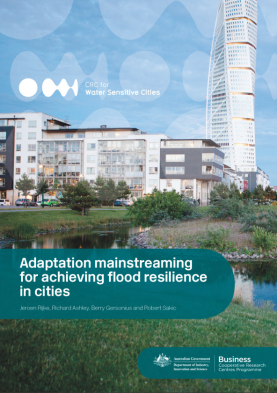Adaptation mainstreaming for achieving flood resilience in cities
Abstract
Many cities across the world have started to adopt resilience approaches for flood risk management. These approaches typically combine different types of interventions to protect against flooding, minimise damages caused by flooding, and recover efficiently after flooding. However, a common challenge for such cities is that the (public) budgets for enhancing urban water systems are under pressure. This has stimulated policy makers to adopt mainstreaming as an important means to implement resilience approaches to flood management.
This report, a product of research for the Cooperative Research Centre for Water Sensitive Cities’ (CRCWSC) project "Socio-Technical Flood Resilience in Water Sensitive Cities − Adaptation across spatial and temporal scales" (Project B4.2), provides guidance to policy makers, planners and project managers for implementing mainstreaming as a means to realise flood risk management strategies as part of a water sensitive approach. Using lessons from Hamburg, New York, Rotterdam and Dordrecht, and reflecting upon the Australian context, we suggest the following steps when considering mainstreaming as a means for achieving flood resilience.
